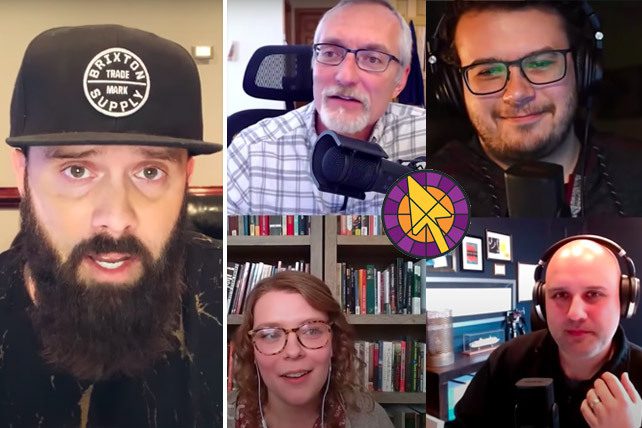Since declaring war on deconstructionism and “fake Christianity” earlier this year, Skillet frontman John Cooper has faced pushback from people who say he’s angry and judgmental. Now he’s also facing criticism from Phil Vischer’s “Holy Post” podcast, where a panel recently took him (as well as author and Christian apologist Alisa Childers) to task for overreacting and not allowing “nuance” in the deconstruction debate.
Both “sides” acknowledge that differing definitions cause roadblocks in discussions about deconstruction. In their podcast episodes, Vischer and Cooper take deep dives into the terminology and its various connotations. An overview of some main points is below; click on the links to access the entire episodes.
Phil Vischer: Is Deconstruction Universally Bad?
“VeggieTales” creator Phil Vischer, who co-hosts the “Holy Post” podcast with author and pastor Skye Jethani, recently explored Cooper’s war on deconstruction. (Author and divinity Ph.D. candidate Kaitlyn Schiess also joined in.) After saying the Christian musician “kind of likes to be at war,” Vischer implies that Cooper is becoming overly “alarmed” about deconstruction, to the point of calling it “a false religion.”
Vischer refers to a recent article by Alisa Childers, author of Another Gospel: A Lifelong Christian Seeks Truth in Response to Progressive Christianity. In “Why We Should Not Redeem ‘Deconstruction,’” posted on the Gospel Coalition website, Childers warns against viewing the deconstruction movement as “potentially positive.” Based on her research (plus personal experience), she says the movement has “little to do with objective truth, and everything to do with tearing down whatever doctrine someone believes is morally wrong.” The end result of deconstructing, Childers writes, “rarely retains any vestiges of actual Christianity.”
Vischer, Jethani, and Schiess laugh about some of Childers’ points, criticizing her for allowing no room for complexity or nuance. Jethani compares her argument to that of earlier generations of Christians who maintained that alcohol was universally bad, with no exceptions.
Schiess, who disagrees that deconstructionism is always “a way into relativism,” argues that it’s possible to learn some things from people you disagree with—while praying for them. Why? Because the Holy Spirit continues to work in them.
Deconstructing: Should We Use Another Word?
Vischer admits he prefers different terminology altogether. Instead of “deconstructing,” he asks, how about changing the phrase to “re-examining my inherited traditions”? That way it doesn’t sound like you’re “taking a wrecking ball to your faith,” he says.
Jethani, meanwhile, suggests the “more palatable” term of “unbundling,” or untangling from certain political and cultural values we may have grown up with in the church. The entire New Testament, he argues, consists of unbundling from customs that Jesus came to abolish.
Schiess emphasizes the importance of equipping young Christians to be able to ask questions when they encounter other beliefs. It’s also important, she says, to draw the line between which subjects are and are not related to salvation.

